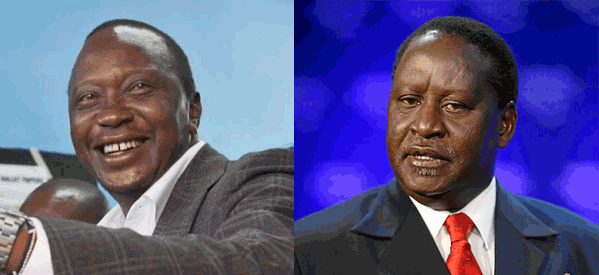Last week Kenyans went to the polls in huge numbers to vote for the first time under a new constitution which was itself voted for by Kenyans in a referendum in 2010 following the devastating election of 2007 which resulted in up to 1500 dead and 250,000 displaced people, many of whom have not returned home and are being permanently settled in other parts of the country.
The election itself was largely contested in a peaceful atmosphere between two factions: The Jubilee Alliance with their candidate, Uhuru Kenyatta, from the Kikuyu tribe and the son of the first President in 1964, Jomo Kenyatta; and The Cord Alliance with their candidate, Raila Odinga, from the Luo tribe and the son of the first Vice-president, Jarimogi Oginga Odinga.
Other minor parties took part including United Democratic Forum Party under Musalia Mudavadi from the Luhya tribe whose campaign, it has been alleged by Cord supporters, was funded by the Jubilee Alliance in order to eat into the Cord vote.
In Kenya, politics is largely tribal and thoroughly corrupt. In the latest index produced by Transparency International, Kenya was ranked 139 out of 174 in the level of corruption. Kenyans rarely ask themselves about the economic policies of their candidates, instead voting along tribal lines. The candidates themselves throw money around like confetti at election time, especially at the time of the primary elections where the parties choose their candidates and a woefully poorly educated population generally votes according to the principle: “show me the money”.
In the Presidential election, in results announced by the IEBC (Independent Electoral and Border Commission) on the 8th of March, Uhuru was declared the winner with 50.07% of the vote, with Raila coming in a disappointing second with 43.31%.
Raila and his Cord colleagues immediately cried foul citing a number of issues:
- In some polling stations the total of votes was greater than the number of registered voters
- The electronic system designed and put in place for the election was abruptly dumped half way through the counting process resulting in the totalling process being done by hand and open to tampering.
- An original count of spoiled ballot papers was reduced by a factor of 8 due to an alleged software bug.
- Each voter had 6 votes to cast: President, Senator, Member of Parliament, Women Representative, Governor and County representative. The total of votes cast for the President allegedly exceeding by over 1 million the totals for the other positions. (Actual totals are yet to be published by the IEBC)
- The election process resulted in the filling in of three different forms: a form filled in at the polling station, a form to tally all the polling station presidential results, and a form to fill for all other positions. In theory the numbers should reconcile but the IEBC has refused to allow the Cord agents to have access to the forms.
- And, in the latest development, University students are reported to have discovered IEBC officials filling in blank election papers in favour of Uhuru.
These issues have led Cord to take the matter to court and having rapidly brought a case together, it has been presented and the swearing-in of the President has been delayed in order to hear the case.
The Raila camp is trying to prove sufficient doubt over the reliability of the count to force the election into a run-off. According to the rules of the election under the new constitution if the two front runners have less than 50% there is a run-off election due to take place sometime in April.
The matter is now in the hands of the court system, which itself is notoriously corrupt so it is not at all clear how the matter will be decided.
What is clear is that the people of Kenya are holding their breath waiting for the courts to work their justice. Although there has been minimal violence until now, no one believes that Kenya is out of the woods yet and a peaceful transition to a new Government is far from assured. The court has 14 days to make its decision.
In Kenya, there are forces desperate for power. Uhuru himself has been indicted by the International Criminal Court in The Hague for charges related to the previous election and his role in instigating the violence. It may be that he sees an election victory as the only way to avoid international justice.
Raila for his part is witness to decades of marginalisation and under-development of his tribe having himself spent time in jail and tortured under the regime of Daniel Arap Moi, and he is desperate to fulfil the destiny that he and his people see for himself.
For their part, the Kikuyus are terrified that a transition of power to another tribe will result in their own marginalisation and inability to access the lucrative contracts that have made many of them wealthy.
Boniface Ogutu, national spokesperson for World without Wars and Violence in Kenya explained:
“Kenya is on a knife edge. We can fall either way into peace or into civil war. We have been working very hard together with the majority of Kenyans to promote peace, and the people are hearing our message. In our own project “No More Stone Throwing” we have calmed down the election tension in Kisumu and Nairobi. However, if the politicians of either side choose to do so they can give a few shillings to thugs and set off another blood bath to rival 2008. The matter is very critical.”










